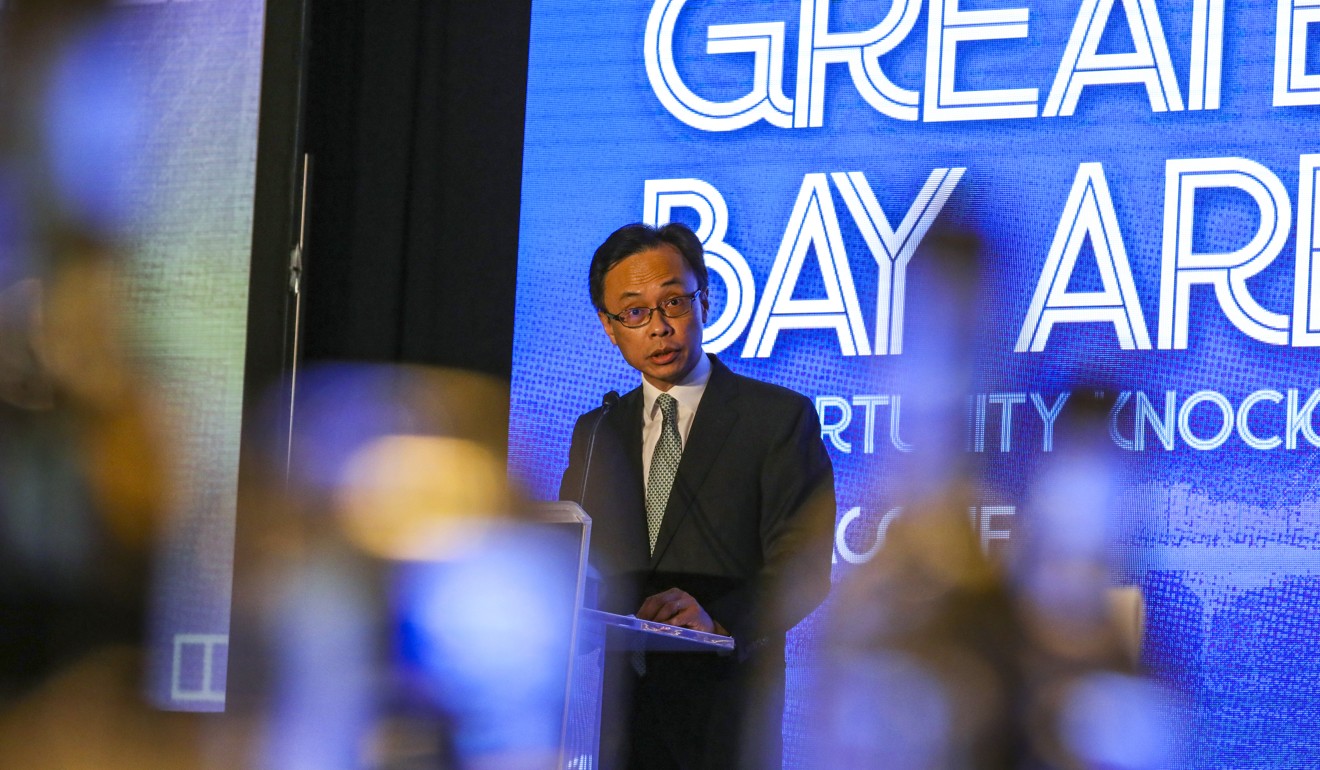
Greater Bay Area plan not a solution to rising property prices in Hong Kong, real estate developers say
- Chinachem chief executive officer Donald Choi says Greater Bay Area plan will not curb Hong Kong’s red-hot market
- He suggests government convert agricultural land to residential properties to address housing crisis
The ambitious Greater Bay Area plan will not curb Hong Kong’s soaring property prices, two veteran property developers have said.
“We cannot force people to go north to live across the border. You can offer them initiatives and opportunities, but Hong Kong is their home,” Chinachem chief executive officer Donald Choi told the audience at the South China Morning Post’s China Conference on Wednesday.
“The elephant in the room is confidence in social institutions. Not just about property, but also about the health system, food safety, education and so on,” Choi, also a former managing director of real estate major Nan Fung Development, added.
The Greater Bay Area initiative is a part of Beijing’s ambitious plan to transform Hong Kong and 10 cities around the Pearl River Delta into a thriving global centre of technology, innovation and economic activities.
Hong Kong, Macau, Shenzhen and Guangzhou would be the four key cities, while Beijing has regarded a closer integration between mainland China and Hong Kong as one of the five main strategies for the initiative.
Hong Kong and Macau are governed by the principle of “one country, two systems” which offers these two cities separate legislative and legal systems, and allows free flow of information and certain rights that are not enjoyed in mainland China.

Choi said both the city and the mainland would have to actively engage with each other to achieve the integration.
“In Hong Kong, we enjoy the freedom of capital flow, travel and information. Both sides need to be more tolerant of different opinions and diversities in lifestyle and culture. It’s a two-way thing, no one can do it alone,” he said.
Choi said the Greater Bay Area plan would become successful as economic power shifted from the West to the East. But he felt the housing problem remained an internal issue for the city, which should be solved by the Hong Kong government.
Choi said the current government adopted from the city’s colonial administration the habit of relying on land sales for revenue generation, while failing to offer more subsidised public housing schemes such as that in Singapore. He added private properties alone would not solve Hong Kong’s housing crisis.
He suggested the government convert agricultural land in the city to residential properties and other usage to optimise land use and raise the proportion of public housing for every private property built.
The government could also consider spreading out land premium throughout the lifetime of the property rather than collecting upfront payment in the beginning of the capital investment, to ensure initial cost remained lower, Choi said.
“The government has a role to play in providing housing to Hongkongers. It is not really welfare. It is a right for every Hong Kong citizen to have decent housing. The government actually has a lot of resources to work on to resolve conflicts,” he said.
Marcos Chan, head of research on the Greater Bay Area and Hong Kong at American real estate investment firm CBRE, said the Greater Bay Area initiative would actually drive Hong Kong property prices higher.
While the city only leased out around 20,000 units a year, there would be more than 10 times that number of potential buyers if only 0.5 per cent of the Greater Bay Area’s 70 million population were interested in buying a property in Hong Kong, he said.
Choi also said youngsters in Hong Kong did not lack talent and technical skills, but they needed to change their mindset and look at their future as part of China and the world.
“Hong Kong is a part of China and we no longer have a separation with our motherland. We have to acknowledge and plan as part of China’s progress,” he said.

“I’m optimistic that Hong Kong and China will develop together, providing better quality of life and living environment for all people in this region. There will be setbacks during this journey. We have faced problems previously. But each time, especially for Hong Kong, we have come out stronger and more successful,” he added.
Speaking at the conference, Secretary for Constitutional and Mainland Affairs Patrick Nip Tak-kuen said the initiative would help identify new areas of growth for Hong Kong’s economy while allowing it to serve the country’s needs.
“The government will work in earnest with our community for a peaceful environment, so that various sectors, including enterprises, professional sectors and our fellow citizens, can join hands in grabbing the immense opportunities ahead,” he said.
“The government will endeavour to play the roles of facilitator and promoter to help Hong Kong take part in the development of the Greater Bay Area, allowing everyone in Hong Kong to benefit from the region in the years to come.”
Nip also said the Greater Bay Area was unique in the world, as it included Beijing’s “one country, two systems” governing principle, three customs areas and three currencies – the Hong Kong dollar, the Chinese yuan and the Macanese pataca.

